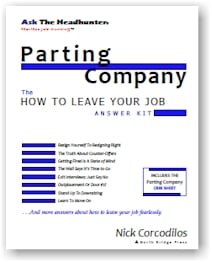In the September 22, 2015 Ask The Headhunter Newsletter, we try to eliminate the jerk factor from networking.
Question
Everyone talks about networking as the best way to find the right job. There must be a key to this approach beyond just going to networking meetings and signing up with one of the online social networks. What advice can you give me about how to do it right?
Nick’s Reply
Last week (Please! Stop Networking!) I offered some How to Say It tips about starting legiitimate conversations with people you’d like to get to know.
 Now let’s talk about how not to be a jerk. What passes as “networking” today can make anyone a jerk. And, if you feel awkward about networking, it’s because you really don’t want to behave like a jerk!
Now let’s talk about how not to be a jerk. What passes as “networking” today can make anyone a jerk. And, if you feel awkward about networking, it’s because you really don’t want to behave like a jerk!
Let’s look at some really stupid ways networking is sold to the public. And make no mistake — it’s sold because someone makes money at this.
Networking meetings
You have no doubt been to networking events where people spend a minute apiece with you, and then expect that you will introduce them to your closest business buddies. Such gatherings have gotten a bad reputation because they can be mercenary and impersonal.
What’s the point of meeting someone if you have no real common ground, and there’s no value in your connection because there are no shared experiences between you?
Online networks
The online social networks are even more problematic. (See LinkedIn: Just another job board.) You sign up, add the names of your co-workers, former employers and friends, and the network links you to other members with similar backgrounds.
But while networks like LinkedIn create lots of connections, there is little emphasis on the quality of those links.
And that’s the key: The quality of relationships. Social networks suggest that having lots of contacts is more important than having good contacts, and they help you highlight your number of links. Why? Because the networks themselves profit mainly from their size. The more members they have clicking on one another, the more ads and digital “services” they can sell. It’s an inherent contradiction and even a conflict.
But the people who benefit from online social networks are the same people who know how to turn a first meeting into a healthy, long term relationship. They know it requires a considerable investment. There’s nothing automated about it.
Phony networking has just one tenet: Behave like a selfish jerk. I think there are three tenets to real networking:
Common ground
First, it requires common ground. People must have something to share that is useful to others. The best place to start is with your work. Identify people who do the work you do (or want to do), then e-mail them, call them, meet them and talk with them about their work and your work. (Not about jobs.)
Value
Second, good networking is sustained by value. Five minutes sharing your elevator speech and business card is worthless.
What can you do to either help or genuinely engage another person? How about a tip that will enable her to be more productive? Or you can ask honest, sincere questions about the work she does. That identifies more common ground. You’ll either find it and build a relationship on it, or you won’t. Don’t fake it.
Time
Third, good networking takes time.This is what networkers have the most difficulty with. Trust grows between people through repeated good experiences. Once I trust you, I’ll draw you into my circle of friends — and that’s where valuable job referrals come from.
The best way to become well-connected is to meet and stay in touch with people who do the work you’re interested and who are good at what they do. Don’t go to them when you’re job hunting. Establish the kinds of relationships — and reputation — that make them want to come to you when they learn about a great job.
How can you put these three tenets of networking to good use to get the job you want?
In Fearless Job Hunting, Book 3: Get In The Door (way ahead of your competition), I discuss “How to make great personal contacts” (pp. 15-17):
“Personal contacts are the foundation of every business. Rather than wait for ‘opportunities’ to come along, learn to participate in your community — go meet people. Learn about their business, get their opinions and advice, and ask for introductions that will help you become a useful member of that community. Personal contacts begin with you reaching out. Start now.”
In Fearless Job Hunting, Book 5: Get The Right Employer’s Full Attention, I tackle the objection many people have: Networking is icky! Only if you behave like a jerk! This is from “Do I have to ‘kiss ass’ to get a job?” (pp. 2-:5):
“When you send a company your resume, you’re not demonstrating anything. All you’re saying is, ‘Here are my credentials, all typed up nicely. Now, you go figure out what the heck to do with me!’ (What’s ickier than that?) A personal contact is a filter that helps a manager find what he’s looking for. A personal contact quickly gives you an opportunity to actually show what you can do — it’s like a voucher that expresses your value and suggests how you will help the company.”
Is your networking based on creating common ground, adding value and investing a lot of time? How does networking work for you?
: :














